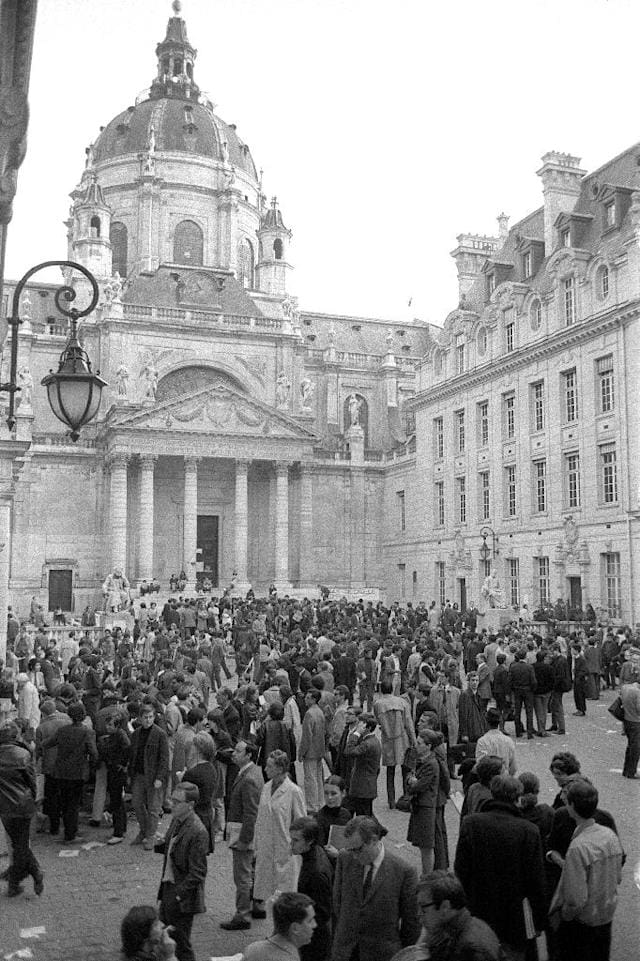There is something jarring about the beauty and symmetry of the barricades in The French Dispatch (2021). Although a visual spectacle for fans of the auteur, Wes Anderson’s polished aesthetics and whimsical film style trivialise the radicalism and social impact of the historic May ‘68 protests. This incongruity between subject matter and cinematography undercuts the significance of student protest as a whole.
‘Revisions to a Manifesto’ is the third of four short stories in The French Dispatch. Inspired by Mavis Gallant’s reflections on May ‘68 for The New Yorker, ‘Revisions’ centres on journalist Lucinda Krementz (Frances McDormand), a reporter on the ‘Chessboard Revolution’. The student revolution is led by a wiry-haired and thinly moustached Zeffirelli B. (Timothée Chalamet). Anderson is often effective at evoking a child-like sense of whimsy and romanticism through his visually exciting cinematography. ‘Revisions’ is no different in its light-hearted depiction of a revolution marked by a carefree sense of youthful idealism.
However, this depiction ultimately belies the reality of May ‘68. The events of May ‘68 were precipitated by protests in late 1967 and early 1968 against restrictions at Paris Nanterre University that prevented male students from entering female dormitories. Dissent quickly spread to other colleges. On a superficial level, the ‘bedroom revolts’ appear trivial. However, these revolts were symptomatic of wider dissatisfaction with an education system that privileged the French technocratic state over student interests. Students resented out-dated teaching practices and the lack of communication between themselves and faculty members.
Student demonstrations peaked on 10 and 11 May, the ‘Night of the Barricades’. The night began as students erected barricades against riot police. Police responded with concussion grenades and tear gas. 367 people were injured. 468 students were arrested. The brutality of the French Security Police was compared to that of Nazi Storm Troopers. The protests garnered public support, and soon escalated into nationwide general strikes; the three biggest French federations called for a 24-hour strike, bringing the economy to a halt. In response, President de Gaulle ordered workers to resume, and was met with overwhelming support from the ‘silent majority’. On 30 May, nearly a million Gaullist supporters marched along the Champs-Élysées, effectively marking the end of May ‘68.
In an article for the Cleveland Review of Books, Dan DiPero notes how May ‘68 has “been the victim of revisionist histories that seek to strip it of its radical politics and the violence with which it was met [with].” On the 50th anniversary of May ‘68, Gucci presented an idealised parody of the protests in its ad campaign, ‘Gucci takes to the streets’.
Both May ‘68 and the ‘Chessboard Revolution’ begin over seemingly innocuous and petty desires to access female dormitories. However, Anderson leaves audiences ignorant to the political and social context of 1960s Paris in the latter. Its rapid escalation into violent protest, when viewed without knowledge of France’s poor education system during the 60s, appears as something to be laughed at. The contents of Zeffirelli’s political manifesto remain ambiguous. The violence of the ‘Night of the Barricades’ is portrayed using the trite metaphor of a chess game. Tear gas is described as nothing more than “fireworks”.
By focusing on the failure of the ‘Chessboard Revolution’, the film further undermines the legitimacy and social importance of May ‘68. The revolution dies down after Krementz tells Zeffirelli to “stop bickering” and “go make love” with a fellow protester. The fictional revolution is nothing more than a product of sexual frustration and its failure is a product of youthful impetuousness. Whilst May ‘68 was a political failure, it created a fertile intellectual climate for the emergent women’s liberation and gay rights movements. Miring protest in narratives of failure produces reductive histories at the detriment of future activism.
What is most unsettling about the film’s ahistoricity isn’t its misrepresentation of May ‘68. It’s that by rendering the political background hazy, ‘Revisions’ presents itself as a parable on the foolishness of all student protest. Krementz’s comments about the “touching narcissism of the young” and their “biological need for freedom” dismisses student protest as an unfortunate symptom of youth rather than a productive response to flawed systems.
We need to reject the trivialisation of student protest. When historical depictions like Anderson’s undercut the importance of student protest through shallow mischaracterisation, it’s up to the individual to recognise the political and social significance beneath the surface. We protest because we see fault in the systems around us, not because we find beauty in placards and megaphones.
It should be of no surprise that Anderson’s picture-perfect film-making is not a suitable lens for the nuanced portrayal of political revolt. For social unrest and disorder of this kind, perhaps we need a little less symmetry.





